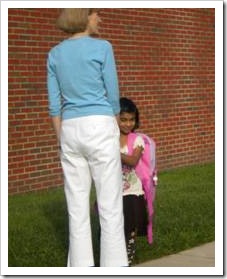 I do not know if this phrase is used a lot where you live, but in several places where we have lived, kids often say they are afraid to “get in trouble”. They typically use this expression in relation to their teacher, principal or some other adult who is responsible for them.
I do not know if this phrase is used a lot where you live, but in several places where we have lived, kids often say they are afraid to “get in trouble”. They typically use this expression in relation to their teacher, principal or some other adult who is responsible for them.
For example, we are on our way to school and Tsoof remembers he has forgotten part of his rehearsal uniform or some school play accessory. He stresses over it in the car and says, “[Word snipped]! Now I’m going to get in trouble”.
Embarrassing as this may be, I find this type of statement very annoying and frustrating. To me, doing (or not doing) something to avoid “getting in trouble” reflects negative external motivation. Not just negative, not just external, both!
And this is precisely the opposite of how I want my kids to be motivated, which means that some other adult in my kids’ life has managed to ruin my hard work (OK, Ronit helps too) and cause my little darlings to be motivated by some external threat. How dare they?!
From then, the conversation goes roughly like this:
“What was that?”
“Yeah, my teacher said we have to bring the whatchamacallit today. I need to bring it. Can we go home and get it? Pleeeease!”
Going back home right away means Eden will miss the bus to work, Noff will be late for school and the person driving will be late for a session with a client. Absolutely out of the question.
 “Tsoof, what sort of trouble will you get into? Will you be shot by a firing squad? Will you be hanged from your toes until your all blood drains through your nose? Are you going to get 15 lashes from a martial artist to the crack of your skin? What’s actually going to happen to you?”
“Tsoof, what sort of trouble will you get into? Will you be shot by a firing squad? Will you be hanged from your toes until your all blood drains through your nose? Are you going to get 15 lashes from a martial artist to the crack of your skin? What’s actually going to happen to you?”
“The teacher will be mad at me”.
“And?”
“I don’t want her to be mad at me”.
“It’s OK to forget things sometimes. You’re very busy with lots of activities and usually, you remember everything. Surely, the teacher knows that”.
“Dad, you don’t understand”, he whimpers, “She’ll look at me like I’ve done something wrong and she’ll tell me I should have brought it”.
“And then?”
“Then, we’ll have to do the rehearsal without it”.
“Is that a problem?”
“Not really. Other people forget things too and we just use something else in the meantime”.
“So you’re saying that if you don’t bring your whatchamacallit to rehearsal today, the teacher will look at you like you haven’t brought it, which you haven’t, she’ll say you should have brought it, which you should have and you already know it, and then that’s it?”
“Pretty much, but you don’t understand. I’ll get in trouble”…
The fear grip of these teachers is so debilitating to the kids it takes 2-3 rounds of this conversation to get them to calm down and just go to school without their whatchamacallit for that one day.
 You should know that our kids are always involved in extra-curricular activities of the performing kind, which means they always need a change of clothes (at least one), another pair of shoes, a set of accessories and, in Tsoof’s case, his stick back (for Percussion). Their attendance record is perfect and most of the time they have all their gear and arrive on or before time, sometimes despite logistic challenges beyond their control.
You should know that our kids are always involved in extra-curricular activities of the performing kind, which means they always need a change of clothes (at least one), another pair of shoes, a set of accessories and, in Tsoof’s case, his stick back (for Percussion). Their attendance record is perfect and most of the time they have all their gear and arrive on or before time, sometimes despite logistic challenges beyond their control.
Yet they give themselves no credit for being good and dependable most of the time. When something is missing, the barometer hits the roof and they have the fear of “trouble” as if they might be run over by a really fast and really heavy and really long freight train (you know, one of those endless ones).
Annoying, no?
Of course, other than doing as many rounds as it takes of “You teacher is a human being and she’ll understand (you’ve said yourself it was no problem for Peter last week)”, the most important thing to do is … nothing.
Turning the car around and going back for the whatchamacallit is the biggest possible mistake you can make as a parent in this situation. It tells your kids that YOU are afraid of the teacher too.
Yes, yes, I know it is tough when your kids go all mushy on you and whine, but it really is a good experience for them. It will teach them a few very important things:
- “Stuff happens. Everyone forgets things sometimes. It’s OK”
- “Teachers are human. When stuff happens, they work with what they’ve got. What choice do they have, anyway?”
- “My parents let me face the consequences of my own actions (or inactions, as the case may be), so I’d better take responsibility for my stuff”
- “There are other people I need to consider sometimes and they are important too”
- “Generally, I do the right thing and it counts for something. Human perfection is a myth, but I come pretty close most of the time, so that’s good enough”. Mind you, you need to work this one into the discussion with the kids. Keep directing them to the good things they have done and telling them they count
 There are all kinds of teachers in the world, but sometimes, this fear-based motivation is actually transmitted from other parents through your kids’ friends. I have asked teachers about missing whatchamacallit incidents in the past and they have mostly been OK with them. However, I have also overheard my kids telling their friends they had forgotten something and receiving the response, “Oh my God, you’re gonna get in trouble”.
There are all kinds of teachers in the world, but sometimes, this fear-based motivation is actually transmitted from other parents through your kids’ friends. I have asked teachers about missing whatchamacallit incidents in the past and they have mostly been OK with them. However, I have also overheard my kids telling their friends they had forgotten something and receiving the response, “Oh my God, you’re gonna get in trouble”.
So realize that by squashing the notion that disappointing an adult carries some scary consequences, you are not only helping your own kids, but also the kids of others, because when the other kids come to school and realize they have forgotten their special hat, braces or spare battery, your kids will be the ones saying to them, “Don’t worry about it. The teacher will understand and we’ll find a way around it in the end. Relax”.
Isn’t parenting fun?
Gal











